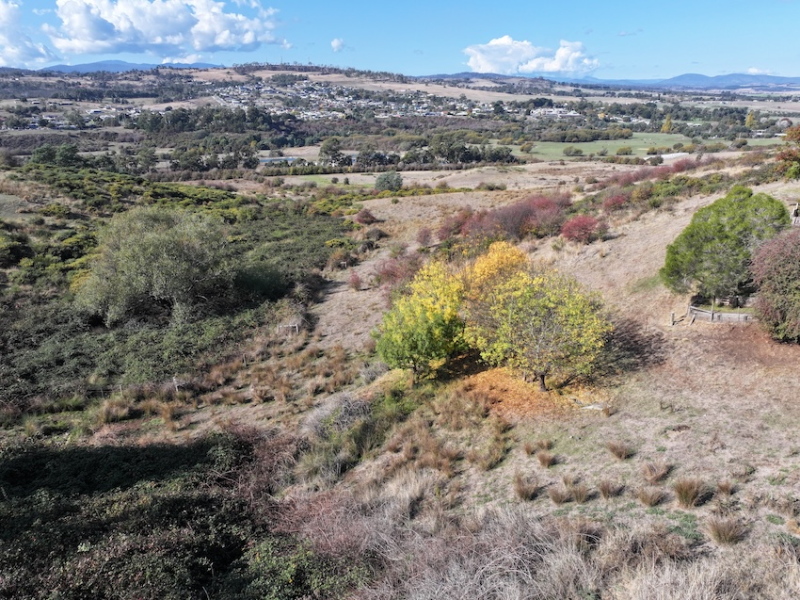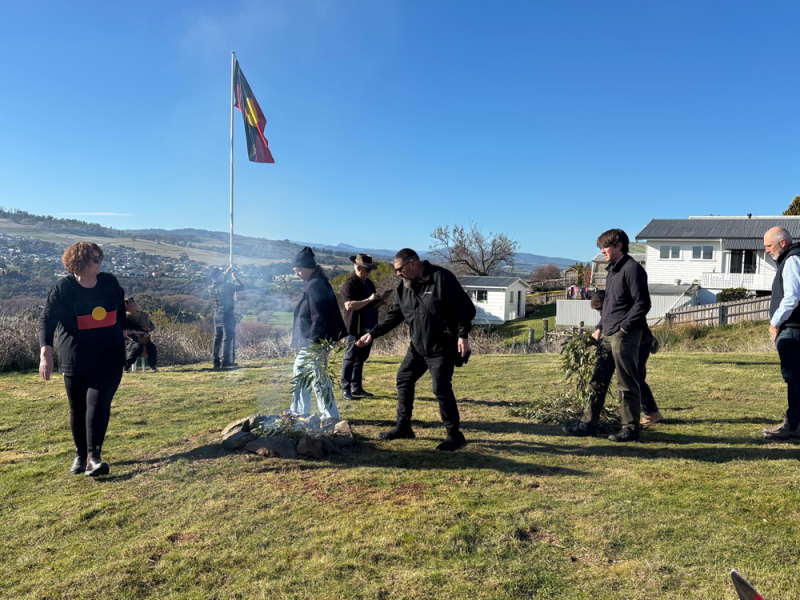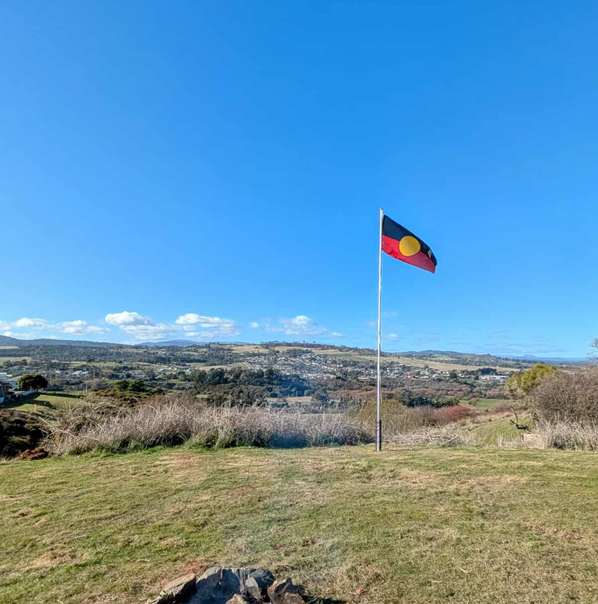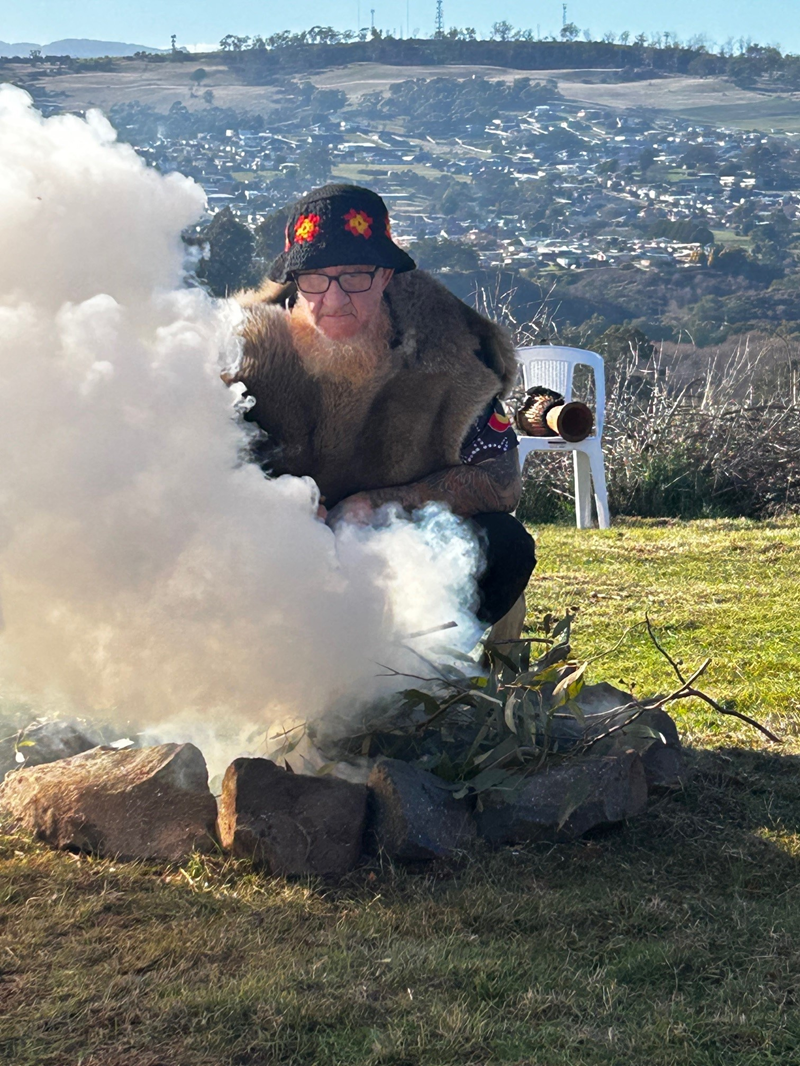Making the space to grow
Mara Melaythenner Aboriginal Corporation sees opportunities to promote Tasmanian Aboriginal culture and Country in unexpected places. It has established a community program to care for older people in their homes and for Country at the same time.
Now, the corporation is giving a large block of pastoral land a new life as a space for community connections. It’s a long-term vision for Pairrebeenne/Trawlwoolway man and director, Grant 'Tank' Shaw, who has returned home to Country and formed a positive network of people to make it happen.

An aerial view of the corporation's Norwood property
Ideas becoming actions
The corporation is relatively young, but the idea for it is decades old. Tank explains how the vision brought him back to Country from living in Queensland as he sought the health benefits in connection to culture – and wanted to provide them for others.
'We're here for a reason: we're here to educate, but we're also here to be part of the community and help out,’ he says. ‘When I returned to Tasmania, I saw the need for a safe space, for inclusion, for everyone to come and learn about the culture. So we incorporated on 22 February 2023 with an aim for pride, passion and purpose.’

Smoking ceremony at Mara Melaythenner's first NAIDOC
Mara Melaythenner also registered for charity status a few months later. Since then, the team has been taking opportunities to support connections between people, Country and culture. Sometimes those opportunities come in unexpected ways.
The corporation’s Urban Rangers program provides yard maintenance for elderly community members, but it goes far beyond pulling weeds and trimming bushes. The program has a core of community care, supporting Elders and creating meaningful connections. It’s registered with the National Disability Insurance Scheme (NDIS) and supports people staying in their own homes for aged care.
'We'll do everything from trimming to hedging to fixing a gate. I changed a light bulb the other day at an Auntie's place.' Tank explains. ‘We've become NDIS registered, so we can work with some of the organisations that do home care plans with elderly people. Also, some Elders just need a bit of company. They might be by themselves, and they just want a bit of a chat. I go to one of our Aunties who's 94. I do weeding for her and when I'm finished, I sit down and have lunch with her. It’s about community spirit as well as being a service.’
Making opportunities out of challenges
Urban Rangers launched in January 2024 and was the corporation’s first program. In February, Mara Melaythenner signed a lease on a 40-acre block in Norwood. This overgrown piece of land was a neglected cow paddock. Locals hadn’t considered it as being useful. Tank had other ideas, and the community was happy to get involved.

The Aboriginal flag flies proudly at the top of the Norwood property
‘A lot of businesses wanted to help and be part of the program,’ Tank notes. ‘A local business is able to mulch it to a bare paddock so we can start planting natives. We've been having working bees and getting the community involved, coming down to help with doing a bit of cleanup on the property.’
The area was loaded with different kinds of invasive berry bushes. Even those have a practical purpose and value.
‘There are a lot of sloe berries on the property, which are used for making sloe gin,’ Tank says. ‘Rather than just chopping it all down, we’ve found a buyer who wants them all off the property. We're making some money off of the plants that shouldn't be there, which is the first little bit of income for the corporation.’
Planting seeds for future benefits
As well as taking opportunities, good planning and relationships have been important for Mara Melaythenner. Tank’s years of networking has opened doors when they’re most needed.
‘We got a grant for all the machinery and equipment to get the project moving – and now we’ve had our first NAIDOC on the property. We're seeing progress because of networking for a lot of years, talking to people and giving out my number. People ring me telling me they remember talking about this a long time ago, and they want to help out.’

Tank at the smoking ceremony
When it came to applying for a grant to build sheds as offices on the block through Many Rivers, the CEO remembered Tank from previous conversations.
'The CEO of Many Rivers was one of the first people I talked to about 5 years ago, so she already knew about me and my program. It shows you stick to your word and the truth, you seem to slowly get there, and you get the support. You just never know when those relationships are going to come back and give you what you need at that particular time,' he says.
Bringing the vision to life
As the team plans uses for the Norwood block, Tank keeps finding ways to make it a safe, inclusive space where Aboriginal and non-Aboriginal community members could learn together. 'We're about involving everyone in the greater community that wants to be part of our community,' he says. 'We're coming from a place of kindness and understanding.'
One way to do this is to share culture through food. As a cook and bush food champion, Tank has a strong focus on using native ingredients to promote culture, connection and good health. He’s excited to see there are already a few plants being revealed as the weeds are cleared.
‘We found a whole heap of native plants when we worked,’ Tank recalls. ‘We had an ecologist take a look at the property for us and found 5 or 6 native plants growing already. One of them is a native cranberry, which is quite hard to keep and grow.’
The hard work is paying off for the corporation and the community. Every step reveals a new opportunity. But the whole journey is also something to celebrate as people come together to make a long-term idea happen.
'We're not about doing things quickly. We're about doing things properly,' Tank says. 'The whole purpose is to help Tasmanian Aboriginal people be self-determined and proud. We’re doing it for the community – so the whole community can benefit.’